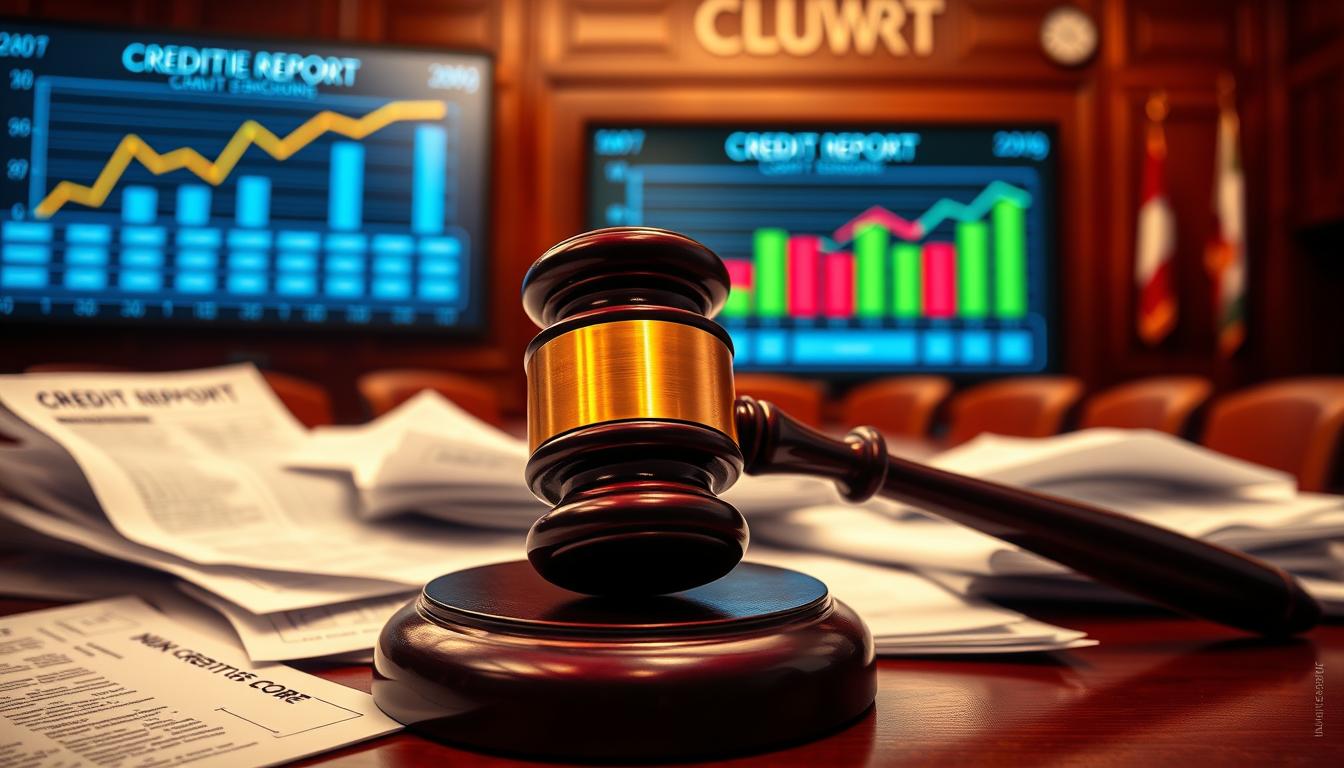The Equifax data breach exposed millions of Americans’ personal information. This led to a rise in mixed credit files and credit report errors. These issues can seriously damage credit scores and make getting loans difficult.
This guide will help you understand your rights and take action. You’ll learn how to sue Equifax and dispute credit report errors. By doing so, you can protect your financial health.
Key Takeaways
- The Equifax data breach exposed the personal information of millions, leading to an increase in mixed credit files and credit report errors.
- Mixed credit files and credit report errors can have a significant negative impact on your credit score and ability to obtain loans and credit.
- Consumers have legal grounds to sue Equifax for mixed file issues under the Fair Credit Reporting Act (FCRA).
- Disputing credit report errors and taking proactive measures to protect against identity theft are crucial steps in addressing credit file problems.
- Equifax settlement claims and credit monitoring services may provide some recourse for affected consumers.
Understanding the Equifax Data Breach
The Equifax data breach rocked consumer trust in 2017. Hackers accessed Equifax’s systems, exposing sensitive data of millions of Americans. This included social security numbers, birth dates, addresses, and credit card information.
The Impact of the Massive Security Breach
The equifax data breach left victims open to identity theft and financial crimes. Criminals could use stolen info to open fake accounts or take out loans. They could even file false tax refunds, hurting victims’ credit and finances.
Identifying Potential Victims and Risks
- People with exposed data face higher identity theft risks and consumer protection laws violations.
- Victims may struggle to get loans, credit cards, or housing due to credit file errors.
- Long-term effects can last years, requiring constant vigilance to protect financial identity.
The Equifax data breach highlighted the need for strong consumer protection laws. It showed companies must prioritize data security. Identity theft lawsuits continue, making it vital for victims to know their rights.
Affected individuals should take steps to protect their financial well-being. Staying informed and proactive is key to safeguarding personal information.
What is a Mixed File and Credit File Errors?
Mixed files and credit file errors can make credit reports confusing. A mixed file combines information from multiple people incorrectly. This can lead to inaccurate details and credit scores. These errors can cause problems when applying for loans or getting fair rates.
Credit file errors come in many forms. They can include wrong personal info, account history, or identity mix-ups. These mistakes may happen due to clerical errors or identity theft. The Fair Credit Reporting Act (FCRA) protects consumers’ rights regarding credit report accuracy.
Types of Credit File Errors
- Incorrect personal information (name, address, Social Security number)
- Inaccurate account history (closed accounts reported as open, late payments reported incorrectly)
- Identity mix-ups (information from another person’s credit file merged with your own)
- Accounts that do not belong to you (fraudulent accounts opened in your name)
- Outdated or incomplete information (missing positive payment history)
Knowing common credit file errors is key to fixing issues. It helps ensure your credit report’s accuracy. By being alert, you can protect your financial health and keep a good credit profile.
| Error Type | Potential Impact |
|---|---|
| Incorrect Personal Information | Difficulty obtaining credit, employment, or housing |
| Inaccurate Account History | Lower credit scores, higher interest rates, loan denials |
| Identity Mix-ups | Inability to access credit, financial accounts, or other services |
| Fraudulent Accounts | Damaged credit, financial losses, and potential legal issues |
Understanding credit file errors and their effects is crucial. It helps you spot and fix problems with your credit reports. This knowledge empowers you to maintain a healthy financial profile.

Consequences of Mixed Credit Files
A mixed credit report can severely impact your financial well-being. It mainly affects your credit scores, which are vital for determining creditworthiness. These scores play a crucial role in your financial future.
Negative Impact on Credit Scores
A mixed credit report with incorrect information can significantly lower your credit scores. This drop makes it harder to obtain loans and credit. Lenders rely heavily on these scores to assess borrower risk.
Difficulties in Obtaining Loans and Credit
Low credit scores from mixed files can have far-reaching effects. You may struggle to secure mortgages, auto loans, and credit cards. Even renting an apartment could become challenging.
Favorable terms might be out of reach. Lenders may reject your applications outright due to your low scores.
| Consequence | Impact |
|---|---|
| Negative Impact on Credit Scores | Substantial drop in credit scores due to erroneous information or inaccurate credit file errors |
| Difficulties in Obtaining Loans and Credit | Challenging to secure loans, credit cards, mortgages, and even apartment rentals due to low credit scores |
Quick action is essential when dealing with a mixed credit file. Ignoring the issue can lead to long-lasting financial problems. It’s crucial to address these errors promptly.
“A mixed credit report can be a financial nightmare, making it nearly impossible to access the credit and loans you need to achieve your financial goals.”
sue equifax for mixed file
Equifax data breach victims or those with mixed credit files may have grounds to sue. The Fair Credit Reporting Act (FCRA) offers strong consumer protection laws. These laws can support your identity theft lawsuit against Equifax.
The FCRA requires credit bureaus to ensure accurate information in credit reports. Mixed files or errors can lower credit scores and hinder loan approvals. Legal action can help you seek compensation and hold Equifax accountable.
- The FCRA allows consumers to sue credit bureaus for negligence, willful violations, and failure to investigate and correct errors.
- You may be able to recover actual damages, such as the cost of repairing your credit, as well as statutory damages of up to $1,000 per violation.
- In cases of willful noncompliance, the FCRA also permits the recovery of punitive damages, which can significantly increase the potential compensation.
Legal processes can be tricky, but an experienced identity theft lawsuit attorney can help. They can guide you to sue Equifax for mixed file issues successfully. With their help, you can get justice and compensation under consumer protection laws.

“The FCRA is a powerful tool for consumers to hold credit bureaus accountable for their mistakes. If Equifax has failed to protect your personal information or correct errors in your credit file, you may have a strong case for legal action.”
Filing a Lawsuit Against Equifax
Equifax’s negligence with mixed credit files may give you grounds for legal action. The Fair Credit Reporting Act (FCRA) offers protection for consumers. This law can help you seek compensation for harm caused.
Legal Grounds and Consumer Protection Laws
The FCRA grants you rights when dealing with credit reporting agencies like Equifax. You can dispute inaccuracies in your credit report and demand corrections. The law holds these agencies accountable for their actions.
Consumers can file lawsuits for willful or negligent violations of the FCRA. This provides a powerful tool for seeking justice and compensation.
Seeking Compensation and Damages
A lawsuit against Equifax may help you recover damages caused by their negligence. This can include losses from missed credit opportunities and harm to your finances.
You might also receive compensation for time spent resolving the mixed file issue. In extreme cases, punitive damages may be awarded for egregious conduct.
Document all steps taken to resolve the issue to build a strong case. Keep records of communications with Equifax and note how the mixed file affected you.
Consider seeking help from an experienced consumer protection attorney. They can guide you through the legal process and protect your rights.
“Consumers have powerful legal tools at their disposal to hold credit reporting agencies accountable for their negligence. Don’t hesitate to explore your options for filing a lawsuit against Equifax.”
The Fair Credit Reporting Act (FCRA)
The Fair Credit Reporting Act (FCRA) safeguards the privacy and accuracy of consumer credit reports. This federal law gives consumers control over their credit histories. It empowers them with crucial rights to protect their financial information.
Your Rights Under the FCRA
The FCRA grants consumers several key protections for their credit reports. These rights ensure fair treatment and accuracy in credit reporting.
- The right to access their credit report for free, at least once per year, from each of the three major credit reporting agencies: Equifax, Experian, and TransUnion.
- The right to dispute any inaccurate or incomplete information on their credit report, and have these errors corrected in a timely manner.
- The right to be notified when negative information is added to their credit report, allowing them to address any potential issues.
- The right to limit the access to their credit report, ensuring it is only used for legitimate purposes, such as employment or credit applications.
- The right to be informed if information in their credit report has been used against them, such as in the denial of a loan or credit application.
These fair credit reporting act provisions allow consumers to actively maintain their credit report dispute. They help safeguard financial well-being and uphold consumer protection laws.

“The Fair Credit Reporting Act is a cornerstone of consumer protection, ensuring that credit reports are accurate, fair, and respected in the financial system.”
Equifax Settlement Claims and Credit Monitoring
Equifax reached a $700 million settlement after a massive data breach. The deal involves the FTC, CFPB, and 50 U.S. states and territories. It offers affected consumers options for compensation and credit protection.
Eligible consumers can file claims for various benefits. These include free credit monitoring, identity theft protection, and possible monetary compensation. To file, visit the official Equifax settlement website and follow the online process.
The settlement also provides free credit monitoring. This service watches credit reports and alerts users to suspicious activity. It helps address credit file errors and identity theft issues.
| Equifax Settlement Claims | Equifax Credit Monitoring |
|---|---|
|
|
Using these services helps protect consumers’ financial well-being. It guards against long-term effects of the data breach. These measures align with consumer protection laws.
“The Equifax settlement is a critical step in holding the company accountable and providing consumers with the tools they need to protect their credit and personal information.”
Disputing Credit Report Errors
Credit file errors can be frustrating, but taking action is crucial. The Fair Credit Reporting Act (FCRA) offers a clear process for disputing errors with credit reporting agencies.
This includes addressing mixed files, where your information is confused with someone else’s. Protecting your financial well-being starts with fixing these mistakes.
Step-by-Step Guide to Dispute Credit Report Errors
Found errors in your credit report? Here’s how to dispute them:
- Review your credit report thoroughly and identify the specific errors or discrepancies you want to dispute.
- Gather any supporting documentation that can help corroborate your claim, such as payment records, account statements, or identification documents.
- Contact the credit reporting agency (Equifax, Experian, or TransUnion) that issued the credit report with the errors. You can submit your dispute by mail, online, or by phone.
- Clearly explain the errors and provide the supporting documentation. Be sure to include your full name, address, and other personal information to ensure your dispute is properly identified.
- The credit reporting agency has 30 days to investigate your dispute and provide you with the results. If the agency finds the information to be inaccurate, it must be corrected or removed from your credit report.
The Fair Credit Reporting Act (FCRA) gives you the right to dispute inaccurate information. This includes mixed files and incomplete data in your credit report.
Taking action to fix credit file errors protects your credit score. It also ensures your overall financial health stays on track.
“Identifying and correcting credit file errors is a crucial step in maintaining a healthy credit profile. The Fair Credit Reporting Act provides consumers with the tools to dispute inaccuracies and hold credit reporting agencies accountable.”

| Step | Action |
|---|---|
| 1 | Review your credit report for errors |
| 2 | Gather supporting documentation |
| 3 | Contact the credit reporting agency |
| 4 | Clearly explain the errors and provide evidence |
| 5 | Wait for the agency to investigate and respond |
Preventive Measures and Identity Theft Protection
Protecting your personal and financial data is vital in today’s world. Identity theft and credit file errors are on the rise. Implementing strong identity theft protection strategies can help reduce these risks.
Regularly checking your credit reports is a key preventive measure. This helps you spot and fix any issues quickly. Freezing your credit is another effective step.
It limits access to your credit report. This makes it harder for fraudsters to open new accounts in your name.
- Regularly review your credit reports from all three major credit bureaus (Equifax, Experian, and TransUnion) for any suspicious activity or inaccuracies.
- Freeze your credit to limit unauthorized access and prevent new account openings in your name.
- Invest in a reliable identity theft protection service that monitors your personal and financial information for any signs of compromise.
Taking action early is crucial. Consumer protection laws offer support if you fall victim to identity theft. Understanding your rights helps you address issues and seek compensation if needed.
| Preventive Measure | Benefit |
|---|---|
| Regular credit report monitoring | Early detection of errors and unauthorized activities |
| Credit freezing | Restricted access to your credit report, deterring fraudsters |
| Identity theft protection services | Comprehensive monitoring and assistance in case of a breach |
Combining identity theft protection strategies with knowledge of consumer protection laws is powerful. It helps you take charge of your financial health. You can better shield your identity from potential threats.
“The best defense against identity theft is to be proactive and vigilant in protecting your personal and financial information.”
Conclusion
Credit file errors, like “mixed files,” can seriously impact your financial life. The Fair Credit Reporting Act protects consumers from these issues. It’s crucial to understand your rights under this law.
The Equifax data breach showed the need for better oversight of credit agencies. Suing Equifax for mixed file errors helps assert consumer rights. It can lead to compensation and push for industry reforms.
Stay alert and check your credit reports regularly. Dispute any errors you find promptly. Explore legal options if issues persist. These steps help create a fairer financial system for everyone.

